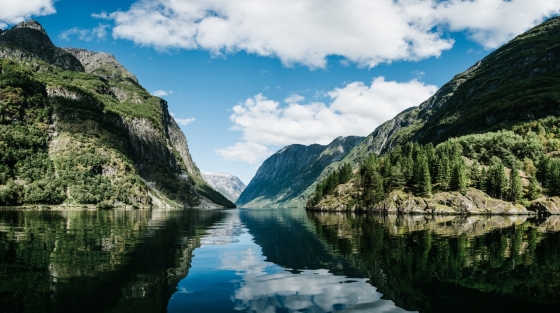Bruvik, Norway - Weather and Climate
The temperature in Bruvik, Hordaland, Norway can vary quite a bit throughout the year.
Temperatures can be pleasant during the warmest months,
and cold during the cooler months.
It also has a relatively rain/snowy climate with high levels of precipitation.
Now, let’s break down all the climate details for a clearer picture.
Average maximum day and minimum night temperature
Visitors to Bruvik can expect significant temperature changes throughout the year. On average, daytime temperatures range from a pleasant 19°C in July to a chilly 3°C in February.
Nighttime temperatures can drop, with average lows reaching -4°C in February.Check out our detailed temperature page for more information.
Temperature ranges by month
Precipitation and rainy days
Bruvik is known for its substantial rain/snowfall, with annual precipitation reaching 2822 mm. The amount of precipitation varies moderately throughout the year. The wettest month, December, sees around 311 mm of snow/rainfall, perfect for those who enjoy a bit of snow/rain now and then. The driest month, May, still receives a respectable 148 mm of rainfall.
The mean monthly precipitation over the year, including rain, hail and snow
Sunshine over the year
In Bruvik, summer days are longer and more sunny, with daily sunshine hours peaking at 6.4 hours in June. As the darker season arrives, the brightness of the sun becomes less. December sees a soft sun for only 0.4 hours per average day.
Visit our detailed sunshine hours page for more information.
Monthly hours of sunshine
Daily hours of sunshine
Average water temperature
The mean water temperature over the year ranges from 6°C in January to 14°C in August.
Water temperature over the year
Average humidity
The relative humidity is high throughout the year in Bruvik.
The city experiences its highest humidity in September, reaching 79%. In April, the humidity drops to its lowest level at 72%. What does this mean? Read our detailed page on humidity levels for further details.
Relative humidity over the year
Average wind speed
The average wind speed over the year ranges from 2 m/s to 3 m/s. It is lower in June, July and August and higher in January, February, March, April, May, September, October, November and December.
The mean monthly wind speed over the year (meters per second)
Forecast for Bruvik



Select a Month of Interest
Check the conditions for any month of the year.
The best time of year to visit Bruvik in Norway
The average rainfall figures in Bruvik are quite high. Throughout the year, you have a chance of prolonged precipitation. So no matter what time of year you go, you will always have to deal with a high number of rainy days. This makes it more challenging to point out the best time of year to visit. If we needed to pick one month we would choose June which is the sunniest month of the year.Other facts from our historical weather data:
July has an average maximum temperature of 19°C and is the warmest month of the year.
The coldest month is February with an average maximum temperature of 3°C.
December tops the wettest month list with 311 mm of rainfall.
May is the driest month with 148 mm of precipitation.
June is the sunniest month with an average of 193 hours of sunshine.
No idea where to travel to this year? We have a tool that recommends destinations based on your ideal conditions. Find out where to go with our weather planner.



